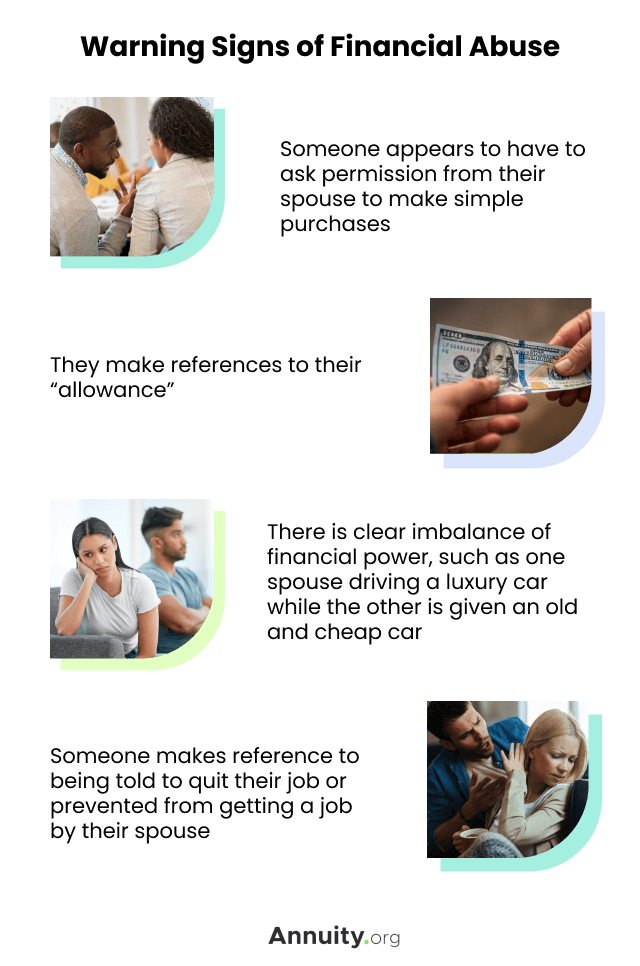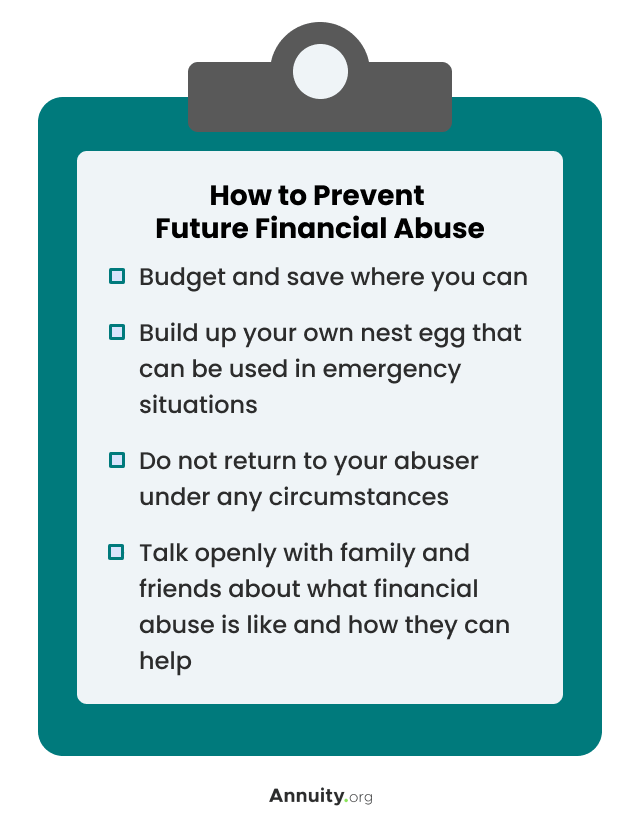What Is Financial Abuse?
Financial abuse is a broad term that can apply to a lot of different problems that victims experience. But at its core, it involves an abuser either stealing money from someone, denying money from someone or using money to exert control and power over them.
Types of Financial Abuse
- Stealing money from someone
- Taking financial control away from someone
- Placing a spouse or partner on an “allowance” and controlling their access to money
- Recklessly spending someone else’s money
- Tricking a senior into giving their money away in a scam
- Taking advantage of an elderly family member to use their money
While it isn’t as well known as other forms of abuse, it is very common and can play a critical role in serious situations. According to the Pennsylvania Coalition Against Domestic Violence, financial abuse occurs in 98% of abusive relationships and plays a huge role in preventing victims from escaping those situations.
“That is the No. 1 reason battered women and men do not leave their partners,” Mary Joye, a licensed mental health counselor who has helped people get out of financially abusive situations, told Annuity.org. “They don’t have enough money to leave. That person usually makes sure you don’t have enough money to leave.”
Financial abuse occurs in 98% of abusive relationships.
The Warning Signs of Financial Abuse
The warning signs of financial abuse can vary depending on the specific situation. It’s also important to remember that financial abuse often escalates over time.
It may start with something simple, like a small ask for some money or to give up a little bit of control. But it can grow over time and eventually result in a victim.
Better understanding the warning signs can help prevent a situation from escalating out of control.
Elder Financial Abuse
There are few groups who are more at risk for becoming a victim of financial abuse than seniors.
Older adults can be easy targets for financial abuse, especially those who may not be familiar with modern technology, are dealing with issues like dementia or can no longer take care of themselves.
Abusers can include scammers and people who attempt to get into contact with seniors to steal their money. That can come in the form of unsolicited phone calls or emails, where seniors are tricked into a nefarious investment or are convinced they are sending money to a family member when it’s really a scammer.
Unfortunately, caretakers can also be a serious cause of financial abuse in older adults. Seniors who need regular help or cannot take care of themselves can fall victim to their caretakers who may deny care if they don’t receive or have control of the senior’s money.
Denying seniors access to care can force them into desperate situations where they must give money to an abuser.
Family members sometimes participate in financial abuse as well. If a family member takes control of a senior’s finances who can no longer manage it themselves and begins stealing that money, then that is a form of financial abuse.
Financial Abuse in Marriage
Financial abuse can also take place in marriages and relationships and can become a key part of domestic abuse situations.
Money is an everyday necessity, and abusers use that to take control of their victims. By taking control of their partner’s finances, the abuser is able to strip the victim of their independence and make it difficult for them to escape the situation.
“They have this ‘what’s mine is mine and what’s yours is mine, too’ mentality,” Joye said. “If you feel like you are suffering and they’re doing just fine financially, there’s an imbalance of power there. It is usually a power play and a control mechanism.”
Examples of Financial Abuse in a Relationship
- Placing a spouse on an allowance
- Forcing paychecks to be turned over to the abuser
- Withholding access to a credit card
- Denying access to basic resources like food or shelter
Source: WomensLaw.org
On top of controlling a spouse’s access to money, abusers may go even further and prevent them from seeking employment or holding a job.
Financial abuse on the surface may seem like it just involves stealing money, but lack of access to finances can quickly result in a total loss of control over one’s own life.
How To Tell If a Loved One Is Being Financially Abused
It may not always be easy to tell if a loved one is being financially abused. In some situations, the victim may have not even acknowledged it themselves since some abusers can be very effective at disguising what they are doing.
Some abusers know how to toe the line of keeping their victim from seeking help, either by changing moods frequently or unexpectedly giving them generous gifts to keep them from suspecting too much.
“They may give the appearance of being generous when, actually, they’re just trying to placate you just enough to keep you bound,” Joye said.
But there are still signs from loved ones and family members to keep an eye on.
For those in relationships who may be being financially abused, one key sign for loved ones to look out for is how they refer to money and their financial situation. If their spouse comes off as an authority figure instead of an equal, it may mean something is going on.
Nearly 80% of Americans don’t recognize financial abuse as domestic abuse.
“When you start seeing somebody suffering or someone says ‘oh, I can’t do that because John won’t let me, I can’t do that because Sally won’t let me.’ These are adults. If an adult won’t ‘let’ you do something or buy something, then something is wrong.”
Another sign is if you notice a family member having to ask for permission from their spouse to make small, everyday purchases or if they make reference to an allowance.
Loved ones should also keep an eye out for financial imbalances within the couple.
“If they see that a husband’s driving a brand new Tesla and the wife is in an old beater, or vice versa, there’s some signs right there,” Joye said.
For family members of seniors who may be going through financial abuse, it is critical to keep an eye on their finances and their caretakers.
If you notice that your family member’s bank account has experienced either major withdrawals or many small ones that have added up over time with no clear explanation, it may mean something is going on.
Similarly, if your family member is communicating via phone or email with someone you do not know offering dubious business or investment opportunities, it may be an attempt to steal their money.

Ways To Get Out of Financial Abuse
The hard truth is that it can be very difficult to get out of financially abusive situations. Abusers can be adept at doing exactly what they need to to keep victims from leaving.
Understanding financial abuse is not as widespread as other forms of abuse, so friends and family members may be less likely to notice that something is going on.
But there are ways for victims to escape these situations.
Depending on the severity of the circumstances, there are domestic abuse hotlines available that may be able to offer help or resources. If the financial abuse is being used as a means to keep a victim in a physically abusive situation, then the police should be contacted.
Victims can also reach out to family or friends that might be able to take them in and support them for some amount of time while they recover or rebuild their own finances.
One important thing to remember when attempting to leave a financially abusive situation is that it can be risky or detrimental to give up control of your money forever to get out of the situation.
“You need to develop an exit strategy, and part of that is money,” Joye said. “It’s very frustrating when I hear clients tell me ‘I’ll just give him or her everything. I just want out.’ But then when they get out, they have no money for an apartment.”
How To Rebuild Your Finances After Abuse
Rebuilding your finances after financial abuse can be challenging, but it is far from impossible. Having a strong understanding of financial literacy can help to make the right choices to begin building up your own financial security.
In the short term, friends or family members may be able to help you get back on your feet. There are also many domestic abuse shelters that may be able to provide temporary housing.
After that, securing a job and developing your own stream of money that goes directly to you is critical.
Building up finances may require a lower standard of living in the beginning. But giving yourself the opportunity to build up a nest egg through budgeting wherever possible and saving as much as you can makes a huge difference in achieving financial independence.

How To Report Financial Abuse
It is critical to report financial abuse if you suspect it is occurring, especially since it can often be tied to domestic violence situations.
One of the easiest ways to report is to contact a domestic abuse hotline. You also may want to consider reaching out directly to the police depending on the situation.
The National Domestic Violence Hotline is 800-799-7233.
When looking to report a financial abuse situation, one of the first steps is to record what you believe is happening and gather evidence if you can. After that, you can report the abuse.
It also may make sense to get the victim away from the situation before reporting it to ensure that they are not put into harm’s way or face retaliation from the abuser.
It’s important to remember to act if you believe you are aware of a financially abusive situation. Victims are not always able to escape from these situations on their own.
Helpful Resources for People Who Are Being Financially Abused
If you are in a financially abusive situation, there are many resources out there that may be able to help.
Remember that the domestic violence hotline is 800-799-7233.
If you need to get out of a situation immediately and don’t have the financial capability to do so, there are domestic shelters across the country that can give you a place to go free of charge.
DomesticShelters.org has a simple search function to help you locate options near where you live.
The National Network to End Domestic Violence includes resources and information on financial abuse, as well an information for friends and family on how to help victims escape these situations.
The National Domestic Violence Hotline website offers plenty of resources and information, including ways to get help and what to do after you have left the situation. The website also includes easily searchable access to local resources.
When you are looking to rebuild your finances after getting out of the situation, there are options for free financial advice available.
The Financial Planning Association offers free financial advice to both low-income individuals and domestic abuse survivors.




